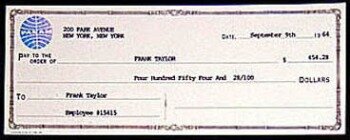
It can also monitor profitability and identify opportunities and potential problems in a more timely and accurate manner. The accrual accounting method provides a more accurate picture of a company’s profitability, growth and overall financial health at any point in time. This standard accounting practice has no delay in expenses or cash exchange. However, without the right accounting system some businesses may find the accounting method too complex. Under cash accounting, the company would record many expenses during construction, but not recognize any revenue until the completion of the project (assuming there are no milestone payments along the way).
- This means companies record revenue when it is earned, not when the company collects the money.
- In early August, it appears your change of direction has paid off because July’s income statement shows a sizable profit.
- We don’t guarantee that our suggestions will work best for each individual or business, so consider your unique needs when choosing products and services.
- Accrual-based accounting conforms to GAAP, but cash-based accounting does not.
Unlike the cash method, the accrual method records revenue when a product or service is delivered to a customer with the expectation that money will be paid in the future. Likewise, expenses for goods and services are recorded before any cash is paid out for them. The main difference between accrual and cash basis accounting lies in the timing of when revenue and expenses are recognized. The cash method provides an immediate recognition of revenue and expenses, while the accrual method focuses on anticipated revenue and expenses. Accrual accounting uses double-entry accounting, where there are generally two accounts used when entering a transaction. This method is more accurate than cash basis accounting because it tracks the movement of capital through a company and helps it prepare its financial statements.
When Should Revenues Be Recognized Under Accrual Accounting?
Accrual-basis and cash-basis accounting each have their advantages and drawbacks. There are logical reasons, such as company size and budget, that might lead a business to prefer one system over the other. If you are unsure which approach is best for your business, it may be a good idea to seek professional advice to determine if your company should use cash or accrual accounting. Additionally, accrual-basis accounting offers a complete and accurate picture that cannot be manipulated. When evaluating a company based on exactly when cash is on hand or paid out, it is easier to misconstrue the financial state of a business.
3 Accounting Methods You Need To Know In 2023 – Forbes
3 Accounting Methods You Need To Know In 2023.
Posted: Tue, 24 Jan 2023 08:00:00 GMT [source]
What isn’t obvious, however, is that July’s profit is actually from June’s activity and the type of work you’ve decided to no longer do. Our partners cannot pay us to guarantee favorable reviews of their products or services. Accrual accounting is encouraged by International Financial Reporting Standards(IFRS) and Generally Accepted Accounting Principles (GAAP). As a result, it has become the standard accounting practice for most companies except for very small businesses and individuals. Smith’s Computers sends a check to Tom’s on March 15, which is deposited the same day by Services Inc.
The method businesses choose will not determine their profit; it only determines when they record a transaction. Although the choice of accounting may affect the amount of taxes what is a lookback period form 941 and form 944 they pay in one year, the following year’s taxes will most likely offset those savings. Retail shops also offer good examples of expense recognition under accrual accounting.
What is accrual-basis accounting?
Now let’s assume that I paid office rent of $1,500 and incurred $300 of costs for electricity, gas, and sewer/water during December. However, the utilities will not read the meters until January 1, will bill me on January 10 and require that I pay the bill by February 1. Also the December 31 balance sheet will report a liability such as utilities payable of $300 to communicate a more accurate measure of obligations at December 31.

Knowing exactly how much cash is available helps determine when bills get paid or how quickly. Cash-basis accounting documents earnings when you receive them and expenses when you pay them. However, the accrual method accounts for earnings the moment they are owed to you and expenses the moment you owe them; it does not matter when your money enters or leaves your account. That is important, as receiving or sending payment is not always immediate.
Accrual Accounting vs. Cash Basis Accounting: An Overview
Accrual Concept is a kind of accounting estimate as you don’t know the actual value of expenses. Accrued venues refer to goods or services that the entity sold or performed to its customers but not yet billed or paid by them. In many cases[citation needed], these guidelines indicate there is a trial period (usually 30 to 90 days) where no time is awarded to the employee.

It will additionally be reflected in the receivables account as of December 31, because the utility company has fulfilled its obligations to its customers in earning the revenue at that point. The adjusting journal entry for December would include a debit to accounts receivable and a credit to a revenue account. The following month, when the cash is received, the company would record a credit to decrease accounts receivable and a debit to increase cash. Another example of an expense accrual involves employee bonuses that were earned in 2019, but will not be paid until 2020.
How Accrual Accounting Works
The utility companies send their invoices on a billing cycle, which runs from the 20th of the current month to the 19th of the following month. So, the company receives the current utility bills on the 23rd of the following month and not before. The method of accounting that measures the performance and position of a company by recognizing economic activity regardless of whether cash transaction occurs is called Accrual Accounting. Accruals assist accountants in identifying and monitoring potential cash flow or profitability problems and in determining and delivering an adequate remedy for such problems.
The purpose of accruals is to ensure that a company’s financial statements accurately reflect its true financial position. This is important because financial statements are used by a wide range of stakeholders, including investors, creditors, and regulators, to evaluate the financial health and performance of a company. Without accruals, a company’s financial statements would only reflect the cash inflows and outflows, rather than the true state of its revenues, expenses, assets, and liabilities. By recognizing revenues and expenses when they are earned or incurred, rather than only when payment is received or made, accruals provide a more accurate picture of a company’s financial position. Accrual accounting is an accounting method in which payments and expenses are credited and debited when earned or incurred.
The client received the bill for services rendered and made a cash payment on Nov. 25. Under the cash basis method, the consultant would record an owed amount of $5,000 by the client on Oct. 30, and enter $5,000 in revenue when it is paid on Nov. 25 and record it as paid. In other words, the revenue earned and expenses incurred are entered into the company’s journal regardless of when money exchanges hands. Accrual accounting is usually compared to cash basis of accounting, which records revenue when the goods and services are actually paid for. Under the cash basis, the expenses and revenues are recorded and recognized in the financial statements when cash is paid and received rather than occurred. A key advantage of the accrual basis is that it matches revenues with related expenses, so that the complete impact of a business transaction can be seen within a single reporting period.
Accrual accounting is the preferred method of accounting for most businesses because it offers a more accurate representation of a company’s finances. Investors and lenders may require this method, and even if they don’t, the consistency of key metrics could make your business look more stable and increase the chances of receiving funding. Additionally, accrual accounting makes you GAAP compliant, which is a best practice, and could become important down the line. Both concepts show the same amount of revenue in the income statement for cash sales transactions because both concepts simultaneously recognize the revenues transactions.
Loan re-negotiation does not free company, auditors from showing interest liability in financial statements: NFRA Mint – Mint
Loan re-negotiation does not free company, auditors from showing interest liability in financial statements: NFRA Mint.
Posted: Fri, 28 Jul 2023 18:33:51 GMT [source]
Accrual accounting can be contrasted with cash accounting, which recognizes transactions only when there is an exchange of cash. Additionally, cash basis and accrual differ in the way and time transactions are entered. Even startups that start out using the cash method due to its simplicity, tend to eventually move to accrual basis accounting when it comes time to apply for outside funding. So even if you don’t follow this standard now, you will likely have to in the future. For example, salary expenses are records in FS at the time cash related to those salary expenses are paid to the employee.
What is Accrual Accounting?
The January income statement will report the collection of the fees earned in December, and the February income statement will report the expense of using the December utilities. Hence, the cash basis of accounting can be misleading to the readers of the financial statements. Under the cash basis accounting method, a company accounts for revenue only when it receives payment for the products or service it provided a customer. Accrual accounting generally makes the relationships between revenue and expenses clearer, providing better insight into profitability.
These include revenues and assets, such as incoming payments and inventory, as well as expenses, losses and liabilities, such as outgoing payments, vacation time, sick leave and taxes. Cash basis accounting tends to be used by small businesses and organizations that pay taxes via their owner(s) personal tax returns. Under the cash basis method, revenue and expenses are recorded based solely on cash flow.
Accrual accounting is always required for companies that carry inventory or make sales on credit, regardless of the company size or revenue. This method allows the current and future cash inflows or outflows to be combined to give a more accurate picture of a company’s current and long-term finances. However, for credit sales, under the Accrual Basis, revenues and receivables are recognized at the time risks.




